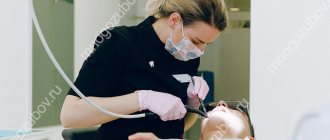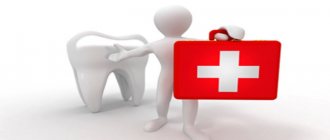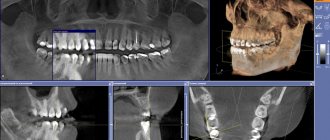Services under compulsory medical insurance policy
Having a compulsory medical insurance policy guarantees unhindered receipt of free, qualified medical care without unexpected financial costs. Presentation of the document is a mandatory condition when applying to any hospital or clinic in the Russian Federation. In the absence of a policy, medical services will also be provided, but on a paid basis.
The basic compulsory medical insurance program includes primary health care, preventive services, and emergency medical care. There is a separate list of services that are provided on a preferential basis or completely free of charge.
Comparative characteristics of both systems
| Compulsory medical insurance | VHI | |
| Conditions | The state determines the choice; the client cannot influence the choice. | Determined by the insurer, the client chooses a package of services. |
| Services | Standard set, regional authorities may expand the list. | Several options at different prices. |
| Choosing a clinic | Any government You can change clinics no more than once a year. | Depends on the selected insurance package. |
| Price | For free. | From 20 thousand and above. |
| Source of financing | Employer contributions, state budget. | Personal income or employer contribution. |
| Visit to the doctor | As usual - by appointment or live queue. | There is priority in service. |
| Standard tests and studies | Covered by the policy. | There may be restrictions on the number of treatments in a given time. |
| Specialized analyzes and studies | By doctor's direction or for an additional fee. In the first case, a long wait is possible. | As directed by a doctor. May be paid or free depending on the selected program. |
| Hospitalization | Provided. | Depends on the terms of the program. |
| Vaccination | Provided. | |
| Specific treatment | By general queue or by quotas. | |
| Rehabilitation | ||
| Treatment of chronic diseases | Provided. | |
| Individual conditions | No. |
Compulsory medical insurance policy free services
Types of medical services that are provided free of charge based on the compulsory medical insurance policy:
- Oncological and dental treatment in accordance with the list of the Russian Health Committee.
- Fluorogram for preventive purposes due to the need to detect tuberculosis in the early stages.
- Preventing common diseases with vaccines.
- Provision of medications and preferential prosthetics.
- Assistance in outpatient and inpatient settings.
Types of medical care provided
1. Primary health care, including primary pre-medical care, primary medical care and primary specialized care. 2. Specialized, including high-tech, medical care. 3. Medical rehabilitation.
General information about the procedures and conditions for providing medical care
Within the framework of the Moscow Territorial Program, medical care is provided in the following forms:
Emergency - medical care provided for sudden acute diseases, exacerbation of chronic diseases, conditions that pose a threat to the patient’s life.
Emergency - medical care provided for sudden acute diseases, exacerbation of chronic diseases, conditions without obvious signs of a threat to the patient’s life.
Planned - medical care provided during preventive measures, for diseases and conditions that are not accompanied by a threat to the patient’s life, do not require an urgent or urgent form of medical care, the delay of which for a certain time will not entail a deterioration in the patient’s condition, a threat to his life and health.
The Territorial Program provides medical care in the following conditions:
Outside a medical organization, including in a specialized vehicle:
— at the place where the mobile ambulance team is called, including specialized emergency medical care, as well as in a vehicle during medical evacuation;
— at the location of preventive vaccinations for the population in places determined by the Moscow Department of Health for organizing preventive measures in order to prevent the population from becoming ill with influenza;
- at the location of events determined by the Moscow City Health Department (including individual diagnostic studies), determined by the Moscow City Health Department in places determined by the Moscow City Health Department for organizing such events.
In an outpatient setting, including at home when a medical professional is called (24-hour medical observation and treatment is not provided).
In a day hospital setting (medical observation and treatment during the day are provided, but round-the-clock medical observation and treatment is not required).
In an inpatient setting (24-hour medical supervision and treatment is provided).
Inpatient emergency medical care is provided without delay.
The waiting period for specialized medical care (with the exception of high-tech) in a hospital setting in a planned form (planned hospitalization), including for persons staying in inpatient social service organizations, is no more than 14 working days from the date the attending physician issues a referral for hospitalization of the patient, and for a patient with an oncological disease (a condition that has signs of an oncological disease), specialized medical care (with the exception of high-tech) in connection with the presence of the specified disease (condition) in an inpatient setting in a planned manner - no more than 7 working days from the date of the oncological consultation and determination treatment tactics. Planned hospitalization is provided if there is a referral for hospitalization of the patient.
Medical care for emergency indications on an outpatient basis is provided by local therapists, general practitioners (family doctors), local pediatricians, obstetricians and gynecologists and is carried out on the day the patient contacts the medical organization.
The waiting period for emergency primary health care is no more than two hours from the moment the patient contacts the medical organization.
The provision of primary health care in a planned form is carried out by prior registration of patients, including in electronic form.
The waiting period for an appointment with local therapists, general practitioners (family doctors), and local pediatricians should not exceed 24 hours from the moment the patient contacts the medical organization.
The waiting period for an appointment (consultation) with medical specialists when providing primary specialized health care in a planned form (except for suspected cancer) is no more than 10 calendar days from the date the patient contacts the medical organization.
The waiting period for an appointment (consultation) with medical specialists in case of suspected cancer is no more than three working days from the date the patient contacts the medical organization.
The waiting period for diagnostic instrumental studies (x-ray studies, including mammography, functional diagnostics, ultrasound studies) and laboratory tests when providing primary health care in a planned form (except for studies for suspected cancer) is no more than 10 calendar days from the date of purpose of the study.
The waiting period for computed tomography (including single-photon emission computed tomography), magnetic resonance imaging and angiography when providing primary health care in a routine manner (with the exception of studies for suspected cancer) is no more than 14 working days from the date of appointment of the study.
The waiting period for diagnostic instrumental and laboratory tests in case of suspected cancer is no more than 7 working days from the date of appointment of the study.
The period for establishing dispensary observation by an oncologist for a patient with diagnosed cancer is no more than three working days from the date of his diagnosis of cancer.
The time it takes ambulance teams to reach a patient when providing emergency medical care should not exceed 20 minutes (in 96% of cases) from the moment the ambulance team is called to provide such medical care.
Waiting periods for the provision of high-tech medical care in a hospital setting in a planned form are established by the federal executive body that carries out the functions of developing and implementing state policy and legal regulation in the field of healthcare.
In medical organizations that provide specialized, including high-tech, medical care in inpatient settings, a “waiting list” is maintained for the provision of specialized medical care in a planned form and citizens are informed in an accessible form, including using the information and telecommunications network Internet, about waiting periods for the provision of specialized, including high-tech, medical care, taking into account the requirements of the legislation of the Russian Federation on personal data.
In order to provide medical care to a patient undergoing treatment in an inpatient setting, if he needs diagnostic tests and it is not possible for them to be carried out by a medical organization providing medical care in an inpatient setting, free transport services are provided with simultaneous accompaniment of the patient by an employee of the medical organization.
One of the parents, another family member or other legal representative is given the right to free joint stay with the child in a medical organization when providing medical care in an inpatient setting during the entire period of treatment, regardless of the child’s age. When staying together in a medical organization of the state healthcare system of the city of Moscow or a medical organization participating in the implementation of the Territorial Compulsory Medical Insurance Program, in an inpatient setting with a child until he reaches the age of four years, and with a child older than this age - if there are medical indications, a fee for creating conditions of stay in stationary conditions, including for the provision of a bed and food, there is no charge from these persons.
When providing medical care in a hospital setting for medical and (or) epidemiological indications established by the Ministry of Health of the Russian Federation, patients are accommodated in small wards (boxes) free of charge.
When providing medical care to citizens entitled to receive state social assistance, the organization of drug provision for which is provided for by the legislation of the Russian Federation, and to certain categories of citizens entitled to receive social support measures in accordance with the legal acts of the city of Moscow, provision of drugs and medical products is carried out , as well as specialized medical nutrition products for disabled children in the manner prescribed by Appendix 3 to the Territorial Program.
When providing, within the framework of the Territorial program of primary health care in a day hospital and in an emergency form, specialized, including high-tech, medical care, emergency, including emergency specialized, medical care, palliative medical care in inpatient conditions, free provision is provided citizens with medicinal products for medical use included in the list of vital and essential medicinal products for medical use approved by order of the Government of the Russian Federation for the corresponding year, and medical devices included in the list of medical devices implanted into the human body during the provision of medical care approved by the Government of the Russian Federation within the framework of the state guarantee program for the free provision of medical care to citizens, in accordance with the standards of medical care in the manner prescribed by Annexes 3 and 6 to the Territorial Program, as well as medical products intended to maintain the functions of organs and systems of the human body, for use at home when providing palliative medical care in accordance with the list and in the manner approved by the Ministry of Health of the Russian Federation.
Within the framework of the Territorial Program, certain categories of citizens are provided, in the manner prescribed by Appendix 9 to the Territorial Program, with emergency medical care in medical organizations of the state health care system of the city of Moscow.
Within the framework of the Territorial Program, when providing specialized, including high-tech, medical care, donor blood and (or) its components are provided in the manner prescribed by Appendix 3 to the Territorial Program.
Within the framework of the Territorial Program, dispensary observation is carried out, which is a necessary examination of persons suffering from chronic diseases, functional disorders, and other conditions, carried out at certain intervals, for the purpose of timely detection, prevention of complications, exacerbation of diseases, other conditions, their prevention and implementation of medical rehabilitation of these persons
The procedure for conducting dispensary observation and the list of studies included in it are approved by the Moscow Department of Health in accordance with the procedure and list approved by the federal executive body exercising the functions of developing and implementing state policy and legal regulation in the field of healthcare.
Within the framework of the Territorial Program for the provision of primary specialized health care, patients who apply to medical organizations (structural units) participating in the implementation of the Territorial Program and do not provide relevant medical services are routed by referring them to other medical organizations (structural units) participating in implementation of the Territorial program to receive such medical services.
To receive medical care, citizens have the right to choose a doctor, including a local physician, a general practitioner (family doctor), a local pediatrician and an attending physician (subject to the doctor’s consent), as well as to choose a medical organization in accordance with legislation of the Russian Federation.
The Territorial Program provides:
Providing medical care during official physical education, sports and mass sports and entertainment events held on the basis of legal acts of the city of Moscow, during official mass events held in accordance with the Federal Law of June 19, 2004 No. 54-FZ “On assemblies, rallies, demonstrations, processions and picketing”, as well as within the framework of ensuring the life safety of the city of Moscow at the request of the Main Directorate of the Ministry of Internal Affairs of the Russian Federation for Moscow, the Main Directorate of the Ministry of the Russian Federation for Civil Defense, Emergency Situations and Disaster Relief for the city of Moscow, the Office of the Federal Security Service of the Russian Federation for the city of Moscow and the Moscow region, the Federal Security Service of the Russian Federation.
Preventive medical examinations (examinations) of minors in order to obtain permission to engage in physical education and sports.
Medical examination of athletes - members of sports teams of the city of Moscow.
Within the framework of the Territorial Program, orphans and children without parental care are provided with medical care of all types, including specialized, including high-tech, medical care, as well as medical rehabilitation, if they are diagnosed with diseases. At the same time, hospitalization of orphans and children left without parental care under the age of 15 years staying in inpatient institutions (in organizations for orphans and children without parental care, social service organizations) (if there are medical indications until they reach aged 18 years) to provide them with medical care in a hospital setting, accompanied by employees of these organizations.
- Decree of the Moscow government on the Territorial program of state guarantees of free medical care to citizens in Moscow for 2022 and for the planning period of 2022 and 2023. (pdf)
- The list of medicines dispensed to the population in accordance with the list of population groups and categories of diseases, for the outpatient treatment of which medicines and medical products are dispensed free of charge as prescribed by doctors, as well as in accordance with the list of population groups, for the outpatient treatment of which medicines are dispensed free of charge or with fifty percent discount on doctors' prescriptions (Appendix 5 to the Territorial Program) (pdf)
- List of vital and essential medications for the provision of primary health care in a day hospital and in an emergency, specialized, including high-tech, medical care, emergency, including emergency specialized, medical care, palliative care in inpatient settings (Appendix 4 to the Territorial Program) (pdf)
- The procedure for providing citizens with medicines, medical devices, medical nutrition, including specialized medical nutrition products, as prescribed by a doctor, as well as donated blood and (or) its components for medical reasons in accordance with the standards of medical care, taking into account the types, forms and conditions provision of medical care (Appendix 3 and 6 to the Territorial Program) (pdf)
- ORDER of the Government of the Russian Federation dated October 12, 2022 N 2406-r “On approval of the list of vital and essential drugs for medical use for 2022, the list of drugs for medical use, including drugs for medical use prescribed by decision of medical commissions medical organizations, a list of medications intended to provide persons with hemophilia, cystic fibrosis, pituitary dwarfism, Gaucher disease, malignant neoplasms of lymphoid, hematopoietic and related tissues, multiple sclerosis, hemolytic-uremic syndrome, juvenile arthritis with systemic onset, mucopolysaccharidosis I, Types II and VI, persons after organ and (or) tissue transplantation and the minimum range of medications necessary for the provision of medical care]" (as amended as of November 23, 2022) (version valid from January 1, 2022) (pdf)
- List of population groups and categories of diseases for outpatient treatment of which medicines and medical products are dispensed according to doctors’ prescriptions free of charge or with a 50% discount (pdf)
- The procedure for implementing the right established by the legislation of the Russian Federation to provide emergency medical care to certain categories of citizens in medical organizations participating in the implementation of the Territorial Program of State Guarantees of Free Medical Care to Citizens in the City of Moscow for 2021 and for the planning period of 2022 and 2023 (Appendix 9 to the Territorial Program) (pdf )
- Criteria for the quality and accessibility of medical care (pdf)
- List of grounds for refusal to pay for medical care (reduction of payment for medical care) (pdf)
What services are included in the compulsory medical insurance policy?
Today, the list of medical care items provided under the compulsory medical insurance policy also includes dental treatment.
The following list of free services is provided:
- Primary consultation and examination. This item also includes care for patients who are unable to move independently.
- Work on drawing up a map of diseases and the features of their elimination.
- Treatment of periodontitis, periodontal diseases, pulpitis and caries. Elimination of problems with the mucous membrane and oral cavity, removal of foreign bodies and treatment of other injuries.
- Reduction of dislocations, operations on soft tissues, removal of malignant tumors and teeth that cannot be restored.
Advice from Sravni.ru:
The terms of the contract that is signed upon receipt of the compulsory medical insurance policy are standard in nature, since they were developed by the director of the Federal Compulsory Medical Insurance Fund A.M. Taranov. in instructions No. 3856/30-3/i dated October 3, 2003. Each health insurance contract is formed taking into account the provisions of the above-mentioned document. Otherwise, the agreement may be declared invalid. The signing of the agreement is aimed at preventing a number of conflict situations. The document also helps to clearly define the existing areas of responsibility of the parties.
Old forms - only upon request
According to the provisions of Law No. 405-FZ, from 2022, a compulsory health insurance policy can be issued in the form of a document on a tangible medium intended for application, storage and transfer of the policy, as well as in the form of a bar code (graphic information in encoded form), made using use of the federal state information system “Unified portal of state and municipal services (functions)”.
At the same time, if information about the insured person will be entered into the state register at the request of a citizen, then the compulsory medical insurance policy in the form of a series of numbers or in the form of a barcode must be issued to the applicant on the day of his application. And if information is entered into the unified register of insured persons on the basis of information received from government agencies in the current monitoring mode, that is, in cases where the citizen himself did not apply for a compulsory medical insurance policy anywhere, but his insurance was carried out in a medical insurance organization determined by the territorial branch of the Federal Fund compulsory health insurance (MHIF), then such a citizen will receive information about the inclusion of his data in the appropriate register automatically within the period determined by the territorial office of the MHIF.
In some cases, the future compulsory medical insurance policy may still exist in paper or plastic form. As Dmitry Khubezov, head of the State Duma Committee on Health Protection, explained to Life.ru, in the future, a policy may be issued on a physical medium upon a separate application, it will be free.
The compulsory medical insurance system is ineffective – Accounts Chamber
Read more…










